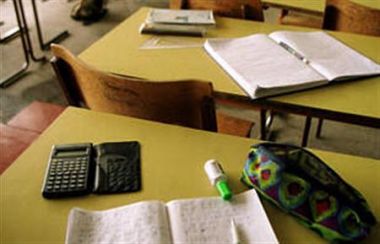Religious studies in schools in decline

Fewer English secondary school pupils than ever are studying religious education at GCSE level, statistics show.
Though the number of those taking up the full RE course has continuously risen since 2009 – now at 258,067 pupils in 2014 – the number of students enrolling in the RE short-course has dropped from 261,399 in 2009 to just 99,601 in 2014.
It means that this year, 70,000 fewer pupils in English schools will complete key stage four with a qualification in RE, compared with 2012 – a drop of 15 per cent.
This new data reflects concerns that religious literacy in British school-aged children is at an all time low.
Though teaching religious education is compulsory in English primary and secondary schools, campaigners have warned that the subject is being "edged out" as the number of specialist RE teachers has fallen and RE did not make it into the list of 'core' disciplines in the recent Government reforms.
Not part of the English Baccalaureate (EBacc) – a performance rating of core subjects, RE now has a reputation of being a 'soft' subject.
Former Education Secretary Michael Gove admitted last year that RE had become an "unintended casualty" of these reforms, while Ofsted warned that pupils were leaving school with a "very limited understanding" of Christianity.
Furthermore, a study conducted in November 2013 found that a third of non-religious secondary schools did not offer any kind of RE teaching for GCSE-age pupils, while16 per cent of all schools said the amount of time devoted to the subject had been reduced for Year 10 students.
Ed Pawson, Chair of the National Association of Teachers of RE, has branded it a cause for "major concern".
"The Government has continually hidden behind the statutory nature of RE, claiming that it provides sufficient protection for the subject, but it's clearly not working," Pawson said.
"Now is the time to reinstate checks to ensure schools are meeting their legal or contractual obligations to teach RE."
Chair of the Religious Education Council of England and Wales, John Keast, also expressed his concern, though he did extend his congratulations to schools which have seen an increase in pupils enrolling on the full RE course.
"These figures support our research which has found RE to be a popular and academically rigorous subject among young people," he said.
"More alarming though is the overall decline in students receiving a solid grounding in RE due to the dramatic fall in short course entries in recent years."
Lydia Palfreyman, an RE teacher from Bristol, says that many pupils simply don't value the subject, and therefore do not consider it a priority at GCSE level.
Even those who don't choose to study it for GCSE, however, have compulsory lessons once a fortnight which she says are "absolutely brilliant" in helping to shape understanding of different faiths.
"I teach in an area with Sikhs, Hindus, Muslims and Christians all in the same school, and it's absolutely brilliant – I think it breaks down a lot of stereotypes," she says.
"There are so many misconceptions, but religious studies is right at the bottom of the pile for a lot of pupils," Palfreyman added. "The problem is, now that it's not in the English Baccalaureate, schools don't prioritise it and it gets lost in the curriculum."
Keast argued that without a basic understanding of different beliefs, British teenagers are ill equipped to cope well in a multi-faith culture.
He warned: "The danger is that, as our society becomes increasingly multicultural and religious division continues to dominate the news agenda, we create a section of society that lacks the understanding of diverse faiths and beliefs that is essential to growing up in twenty-first century Britain."











